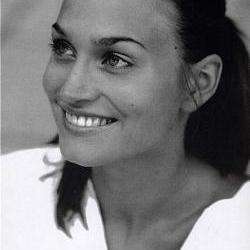Come for the singing, enjoy the music and bring your sunglasses: this psychologically charged Idomeneo is not to be missed.
Damiano Michieletto’s new, modern reading of Mozart’s first mature opera is driven by psychology rather than realism. The stage design (Paolo Fantin) is built on a field of mud and empty boots, symbolizing the loss and devastation of the long war between the Trojans and the Cretans. All the main characters are presented as more or less broken. Ilia (Sophie Karthäuser), a war prisoner with sad eyes and unkempt hair, mourns the loss of her family and struggles with her love of Idamante (Gaëlle Arquez), one of the enemy. Idamante can’t get a straight answer from his distant father, and is struggling with his identity, and Idomeneo (Richard Croft) keeps hallucinating blood-covered, half-naked men from his hospital bed as his guilt threatens to eat him alive. Elettra (Marlis Petersen) has a shopping addiction as well as being quite the “mean girl” (think Real Housewives of Crete). She abuses Ilia, destroys perfectly innocent greenery and cannot wait for Idomeneo to axe his son. Finally Arbace (Julien Behr), by far the most put-together of the bunch, mourns the losses of his country and lights a candle for its soul.
Another prevalent theme is that of fathers and sons. The overture is played to a film (Rocafilm) of a young boy being dressed by his father. This foreshadows Idamante eventually taking on the dress of his father to accept his fate, becoming a man and king. It also underlines that fact that Idamante is soon to become a father himself, to Ilia’s child, born during the closing ballet music. As Ilia sings “Se il padre perdei” in the second act she unpacks baby clothes as a gift for Idomeneo, father to her baby-daddy. Finally, the part of La Voce, the voice of the gods, is played here by a massive sonogram of the fetal son of Idamante and Ilia, representing their future and salvation.
Long story short, the production is heavy on blood, mud, dressing, and undressing. There were some beautiful and effective images, and there were loads of Regietheater clichés. There were also quantities of incredibly irritating, audience-blinding light. And I choose to assume that both Marlis Petersen and Richard Croft get a spa day after having to roll around in mud and be smeared with blood each performance. I also would like to apologize on behalf of the opera establishment to the unlucky costume assistant who got stuck handling all their dry-cleaning.
Musically this production leaves very little to be desired, and for that reason alone it is an absolute must-see. René Jacobs and the Freiburger Barockorchester give complete devotion to phrasing, dynamic, and style in one of the cleanest and most beautifully balanced shows I have heard in the house recently. The voices are also uniformly good, though individual in their execution and character. Richard Croft is an effective and vulnerable Idomeneo, eminently believable as a man coming apart at the seams. What he lacks in vocal volume is well compensated for in musicality and sensitivity, and thanks to the sensitive playing of the orchestra we do not miss a note or nuance. Gaëlle Arquez is an absolutely stunning Idamante. Besides being a gorgeous woman, her vocal color is a miracle of nature. The ease and focus with which she sings made her the discovery of the evening for me. Sophie Karthäuser`s portrayal of Ilia is engaging, and her feathery vocal colorings are well complemented by the favorable orchestral textures, particularly through “Zeffiretti lusinghieri”. Marlis Petersen is a strong presence vocally and physically while obsessively trying on clothes through “Idol mio” in the second act and ripping out her hair in rage near the close of the third. Arbace is not without challenge despite its minor billing, and Julian Behr handles the role with vocal aplomb. Both he and Mirko Guadagnini (Gran Sacerdote di Nettuno) round out this very strong cast nicely. Finally, the Arnold Schoenberg Chor, who are heavily integrated into the action, sounded wonderful. Their clean entrances, strong singing and committed acting made them an essential asset to the production.
So don those sunglasses, it’s time for Mozart.


